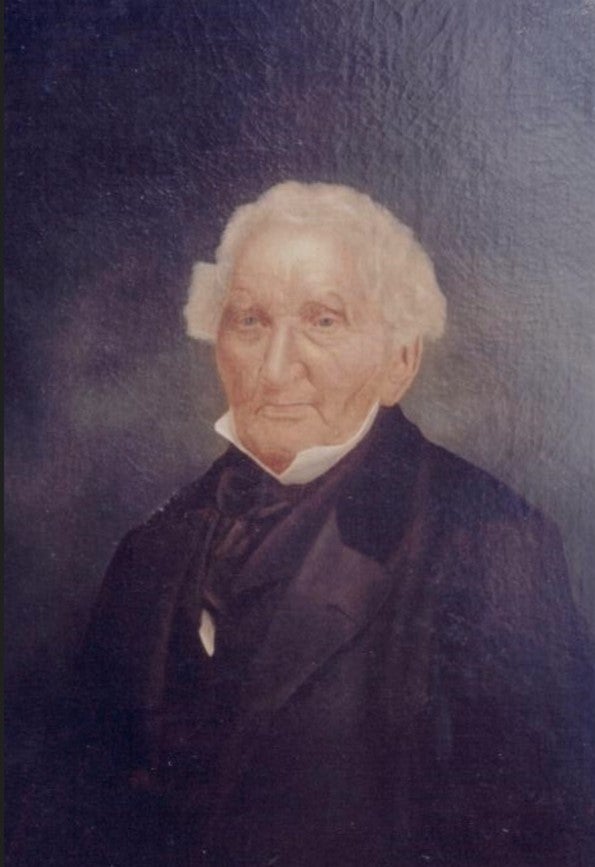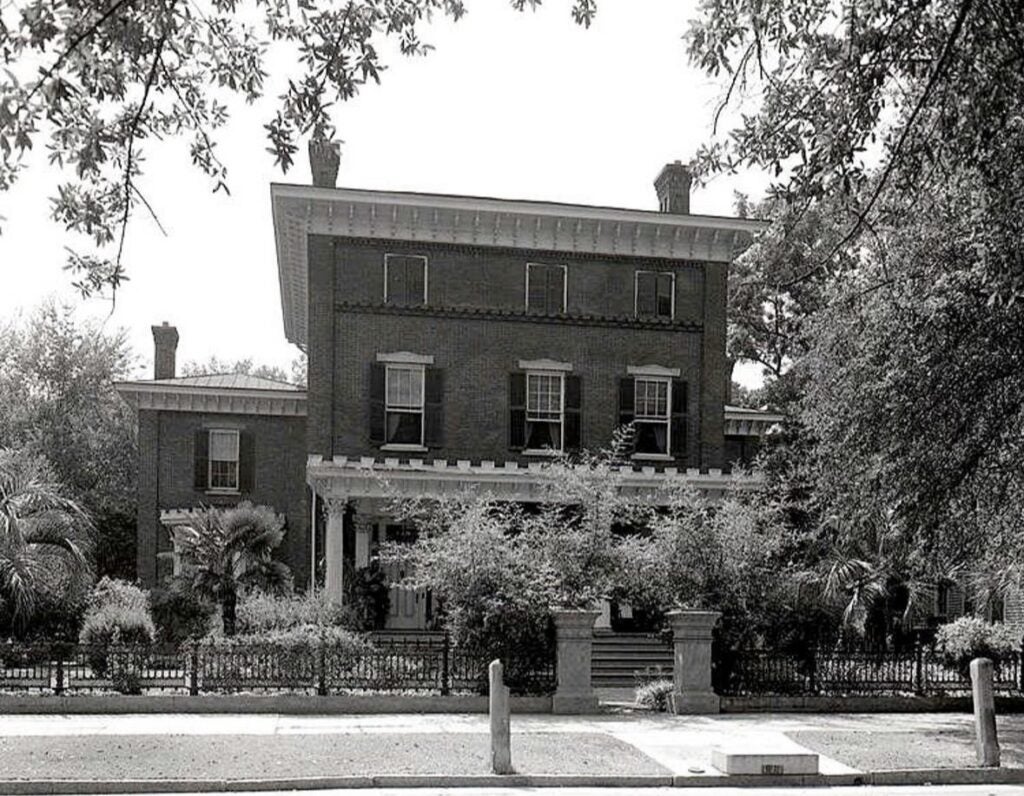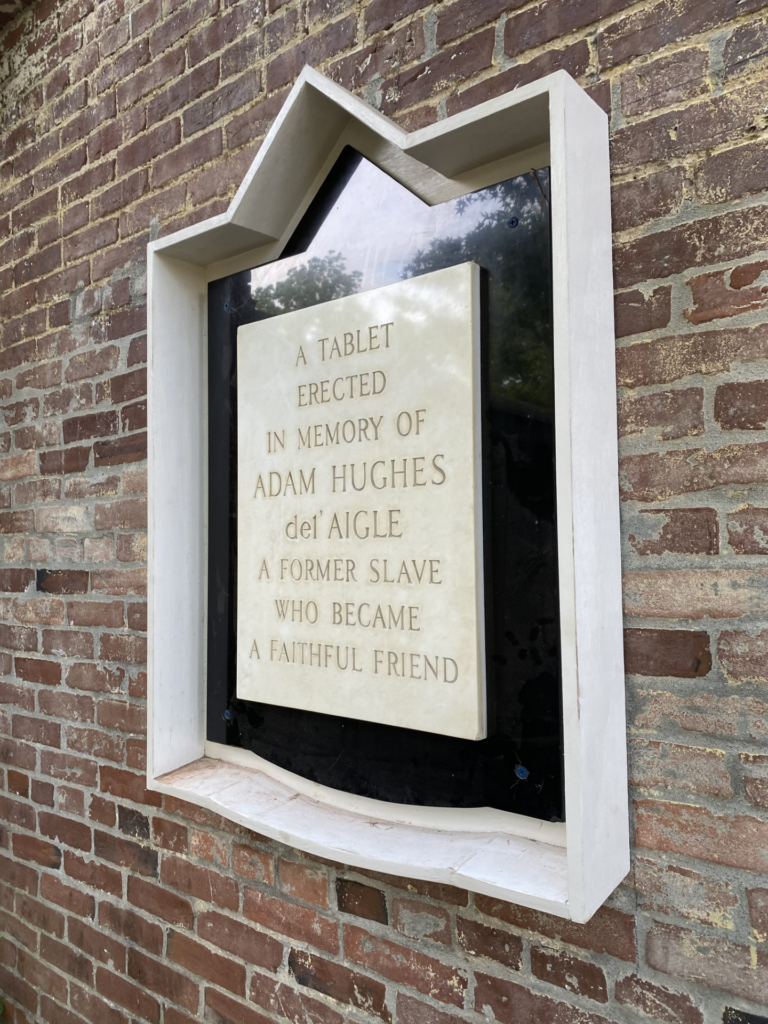Augusta resident Kevin de l’Aigle has made quite a name for himself organizing cleanups in Downtown Augusta and becoming the de facto spokesman for the initiative to save the centuries old oak trees in Downtown Augusta.
As it turns out, de l’Aigle has community service and activism in his genes, as one of the areas he volunteers to maintain is the Magnolia Cemetery, a 60-acre plot of land that his ancestor, Nicolas de l’Aigle, was instrumental in creating and crafted the bricks that make up the elegant wall around the property.
The de l’Aigle family has a rather illustrious history with the surname being tied to many famous battles and wars going all the way back to the Middle Ages.

Genealogy studies performed by the family date back to 1005 C.E. with the birth of Engenulf de l’Aigle.
In those days, proper surnames were not used and Engenuff, who’s name translated into French means “Engenuff of the land of the eagle,” a village in Normandy, is identified on the famous Bayeux Tapestry which chronicles the 1066 battle of Hastings that saw William, French Duke of Normandy, rise to become the king of England.
Engenuff would lose his life in the quest to put William on the throne.
The de l’Aigle family remained ancien noblesse in France until the leaders of the French Revolution sought to wipe out the nobility altogether. Nicolas de l’Aigle was one of those nobles who fled, in 1792, to St. Domingue, a French colony that is today the nation of Haiti.

No sooner than he arrived on the island, de l’Aigle found himself a target in another revolution. This time it was the slaves of St. Dominigue that were rebelling against their French overlords, and de l’Aigle barely escaped with his head a second time.
According to family lore, de l’Aigle was barely able to catch his breath aboard ship when the vessel was attacked by pirates. The pirates began ransacking the ship and killing the sailors, but de l’Aigle was spared, reputedly because he was wearing a Masonic medallion. He had also wisely sewn his gold coins inside of his garments and could claim to be penniless.
Upon arriving in America in 1794, De l’Aigle migrated to Savannah from Charleston and then joined the large French refugee community in Augusta around 1803 where he bought a 16,000 acre cotton plantation and started one of the first major brickyards in the South.
Evidence of de l’Aigle’s brickyards can be seen today in the form of the catfish ponds that line Gordon Highway southeast of Downtown.
Not only did de l’Aigle’s wealth grow, he amassed a fortune in the brick business and almost all of the period buildings that remain in Augusta were built with de l’Aigle bricks; the family also amassed a contingent of between 50 and 100 slaves, according to the late Augusta historian Ed Cashin in his book, “The Story of Augusta,” and that would eventually prove to be the family’s financial undoing.
When American Revolutionary war hero Marquis de Lafayette visited Augusta in 1825, de l’Aigle was at the forefront of the welcoming party and gave a speech totally in French to officially greet the French icon who General George Washington referred to as his “son.”
Late in life, de l’Aigle continued his public service being a vocal advocate for building the Augusta Canal, according to Cashin.
Nicolas de l’Aigle died in 1853 and left his son Charles the family business, but it would not be much longer when the family’s fortunes would change. Charles, a slave owner, was a big supporter of the Confederate cause and even donated the bricks to create the Confederate Power Works facility along the Augusta Canal, of which the chimney still dominates the skyline over Riverwatch Parkway.
According to Kevin de l’Aigle, his mother Katie and father (the late) Jerry de l’Aigle, Charles de l’Aigle made the mistake of investing the family’s money in Confederate war bonds. After the Civil War, the bonds were deemed worthless, and the family no longer had a free workforce, so the wealth literally vanished overnight.

“Most of the properties were sold just to pay the taxes on them,” Katie de l’Aigle said.
One property that had to be sold was the massive mansion on Greene Street and Fourth street. The home had three drawing rooms, a huge brick kitchen and featured mahogany staircases.
“Beneath the house, as was fitting for a French owner, were two plastered wine cellars, floored with brick and provided with shelves along the walls for kegs and demijohns,” Kevin de l’Aigle said.
The Fourth Street home would be demolished in the 1950s to make way for the extension of Gordon Highway into South Carolina.

One slave, Adam Hughes, who adopted and kept the de l’Aigle family surname, refused to give up his post as butler for the family even though they could only afford to pay him a pittance. Upon his death, the family donated a plaque in his honor that still hangs at the memorial garden in Cedar Grove Cemetery where he is buried.
The family name is also tied to the last known duel fought in the state of Georgia. Owing to the family’s financial difficulties, the widowed great-granddaughter-in-law of Nicolas, Mary de l’Aigle began renting rooms in her home, located at 551 Greene Street, to boarders.
One of those tenants was Charles Tilly, an Irish immigrant who arrived in Augusta via New York City. Soon, rumors began to spread that the handsome Tilly had more than a landlord/tenant relationship with de l’Aigle. Tilly believed a man named George Ratcliffe was spreading the rumor.
Tilly challenged Ratcliffe to a duel, and the pair met in person at the sandbar on the Savannah River, near the aptly named Sand Bar Ferry Road with Tilly hell bent on protecting the honor of de l’Aigle.
Things did not end well for Tilly.
According to Kevin de l’Aigle, a member of his family, his uncle Herbert, returned to the family’s native land and participated in liberating Normandy on D-Day in June of 1944.
The de l’Aigle family’s branches are all over Augusta, longtime politico and former Augusta Commissioner Jerry Brigham’s grandfather was a de l’Aigle.
Speaking of politics, Kevin de l’Aigle’s name comes up often as someone perfect to serve in political office; however, he is coy when it comes to the prospects.
“I can definitely say not right now, but I guess I can’t rule it out in the future,” de l’Aigle said.
…And that is something you may not have known.
Scott Hudson is the Senior Investigative Reporter and Editorial Page Editor for The Augusta Press. Reach him at scott@theaugustapress.com












